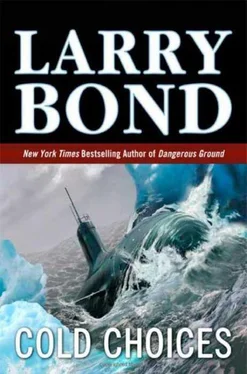Now, at great effort, the Americans had deliberately given him one of the remotes, and it would mean a different kind of victory. It wasn’t lost on him, either, that the vehicle had no tether. He could have done loops around the damn thing for a week, and it wouldn’t have made a bit of difference.
His mistake, his false assumption, had been a factor in this tragedy— possibly the primary factor. Every commanding officer has to live with the consequences of his mistakes. What grieved Petrov was that others were paying for them as well.
The side panel opened, and like everyone else, Petrov crowded in to see. Unlike everyone else, the men gave him plenty of room. Rodionov turned as the captain approached. “It’s all here, sir. The air chemicals, medicines, even some food.” He held up a candy bar with a bite missing. The captain-lieutenant’s grin was infectious, and Petrov could hear the men talking excitedly, almost shouting. It was time to get organized.
Petrov’s voice cut through the hubbub. “All right, the vehicle has been recovered. Anyone who is not part of the torpedo crew, return to your posts.” He pointed to one of the michman. “You. Collect all the medicine and all the food. Turn it over to Dr. Balanov.” He took in the entire group with a stern look. “We’re going to give the food to the injured first.”
There were several audible sighs as candy bars and other items were turned over. Petrov told the michman, “Pick men for a detail.”
Fonarin, in charge of life support, was already present to take charge of the air chemicals. With great curiosity, he examined the six-foot-by-three-foot plastic curtains littered with small pockets. He then picked up a can of lithium hydroxide granules and started to understand. Beneath the first curtain, he found an envelope with the Russian word “Instructions.”
“How considerate of them,” Fonarin remarked gratefully. “They’ve even provided instructions on their equipment in Russian. I will get these curtains distributed and hung immediately, sir.”
“Excellent, Igor.”
“Captain,” spoke the torpedomen michman. “This says it is for you.” He came over to Petrov with a plastic-wrapped package. Lettering on the front in Cyrillic and English said it was intended for the Captain of Severodvinsk.
That made him think of Rudel, and he turned to the intercom. “Central post, this is Petrov. Pass to Seawolf, ‘Thank you. We have the supplies.’”
The reply came back a minute later. “Captain, your message was passed. We heard cheering over their microphone.” Petrov felt almost like cheering himself as he cracked the seal. They had more time for the fleet to arrive, food, badly needed medicine, and now what had to be information. Curiosity filled him.
Then he saw the first photo. Although in false colors, the image showed his wonderful Severodvinsk, listing on the seabed, bow and aft sections scarred. Grief and anger brought tears to his eyes, and he quickly shoved the picture back into the envelope. He hurried out of the compartment, barely noticing the men that quickly jumped out of his way.
His cabin was in the first compartment, flooded and inaccessible. He wanted to examine the contents of the package alone, but that was impossible. Instead, he stood in the tilted passageway, out of the way of the men already bringing up vital supplies, and gathered himself.
In the central post, he called over Kalinin, Lyachin, and the other battle department commanders. They would share the first viewing with him. Several of the officers almost wept when he passed around the first image. The next was a detailed photo of the ragged bow, then worse, the bladeless stub of the propeller shaft. Those three images signed Severodvinsk’s death certificate.
“Oh my God,” rasped Kalinin as he picked up the next photo. Everyone present either gasped or groaned. The picture showed Severodvinsk’ s V-600 emergency buoy lying on the ocean floor, a huge puncture in its tiny metal hull. It had never made it to the surface.
“No wonder we haven’t heard from the fleet,” Lyachin stated in awe. “They had no idea where to look!”
“Our debt to this Rudel fellow continues to grow,” responded Kalinin. There was no disagreement from those present.
After that came a detailed bow-to-stern series of photographs, both port and starboard, and annotated maps of the area, large and small-scale. One was marked with the location of debris from Severodvinsk and Seawolf, torn or broken off during the collision. Petrov was impressed with both the Americans’ thoroughness and the capabilities of their underwater vehicles. But it was a lot to take in. It was almost an hour later when he finally gave the package to Kalinin.
He tried to focus on the basics. Some of his crew had been lost, but the rest were alive, and thanks to the Americans, he didn’t have to pretend they had a chance of survival. But it was time to accept the bitter fact that Severodvinsk was lost. Horribly crippled, in deep water, she would never leave this place. A great sadness came upon him. He didn’t think it would ever go away.
8 October 2008
1300/1:00 PM
USS Winston S. Churchill
Patterson found Captain Baker on the bridge. “I just got a message from SUBGRU Two. They did it.” Patterson handed him the hard copy.
Baker smiled as he read the news. “Three days’ worth of breathable air, medical supplies — Rudel’s done it.” Churchill’s, captain sounded like a proud sibling. “The Russians ought to give him a medal for this.”
“I don’t know about the Russians, but we might,” Patterson agreed. “It gives them time.”
“Not much,” Baker countered. “If the Russian ships arrive on scene tomorrow morning, they’ve got forty-eight hours to come up with and execute a rescue plan.”
“I asked them for their ETA,” Patterson said.
Baker was surprised. “The Russians?”
She nodded. “Through the State Department. I thought it was time to say hello, especially since we’re supposed to be supporting the on-scene search-and-rescue commander.” She shrugged. “Actually, I’ve been trying since we came on board. State says they’re passing the requests on to the Russian embassy, as well as our ambassador in Moscow, but so far there’s been no response.”
“We can try ship-to-ship when they get closer,” Baker suggested. “They haven’t come up on the search-and-rescue radio net. There’s a UN agency called the International Maritime Organization. They have established procedures and radio frequencies everyone’s supposed to use for rescue coordination, but so far Churchill is the only ship using them.” Baker shrugged. “Of course Seawolf can’t, but the Russians should be all over the net.”
Patterson frowned. “Please be careful about communicating with the Russians by radio. As long as it’s coordination, ship movements and such, that’s fine. Anything else is supposed to go through the State Department.”
“Don’t you have a State Department rep on board?”
“Yes, but State wants all our communications to go through the Washington-based staff.”
“Which sounds very clumsy and slow.”
“You’re right. It is,” conceded Patterson.
* * *
Baker walked over to the chart table. Both Churchill’ s projected course and their best guess at the Russians’ path converged on the collision site. “I’ve scheduled a helicopter launch for 0715 hours tomorrow morning.” He saw her expression and the unasked question. He reassured her, “It is the earliest possible minute we can launch. Lieutenant Ross is a good pilot, but he’s never done a personnel transfer with a submarine before and I want him doing this in daylight. The helicopter will also be carrying a lot of cargo, and we’ll be bringing back several of Seawolf’s injured, which means Doc Spiegel has to ride as well.”
Читать дальше












